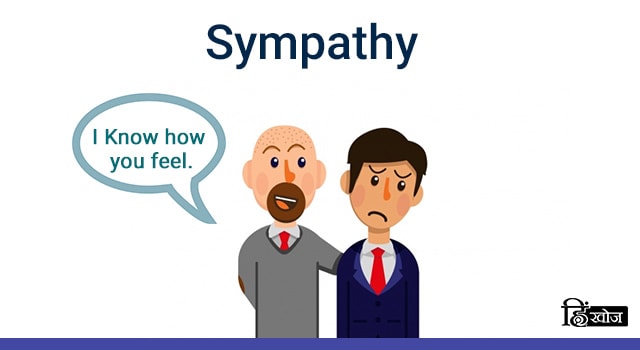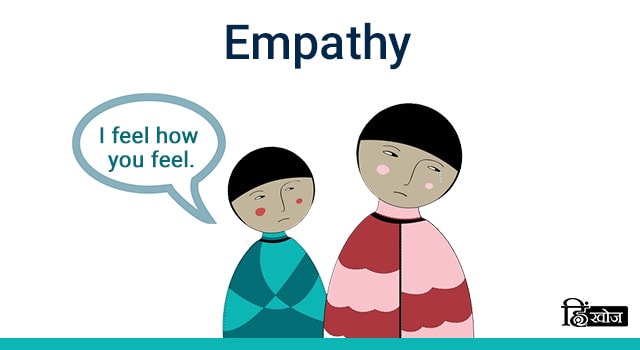The words SYMPATHY and EMPATHY are often confused with each other and we all have this idea that they are interchangeable.
However, that's not completely true.
SYMPATHY और EMPATHY के बीच बहुत ही minute लेकिन important अंतर है।
इन दोनों ही शब्दों का प्रयोग आप किसी अन्य व्यक्ति के प्रति अपनी भावनाओं को व्यक्त करने के लिए करते हैं।
But still, you should know the exact meaning of the two words and how to use them in different situations.
 Though the word has more than one meaning, it's largely used to convey your sorrow for someone who is experiencing misfortune.
यदि आप किसी अन्य व्यक्ति के दुःख या परेशानी में अपनी सहानुभूति व हमदर्दी जताते हैं तो इसका अर्थ है कि आपको उस व्यक्ति से sympathy है।
In a way, sympathy is a feeling that carries a message that you are acknowledging other person's emotional hardships and providing comfort and assurance.
Let's learn how to use this word.
• My family's sympathy on the death of my father gave me a lot of strength.
• मेरे पिता की मृत्यु पर मेरे परिवार की सहानुभूति ने मुझे बहुत ताकत दी।
• She never expressed any sympathy when I was injured.
• जब मै घायल हो गया था तब उसने कभी कोई सहानुभूति व्यक्त नहीं की।
• I have no sympathy for those people who are afraid to work hard in life.
• मेरे मन में उन लोगों के लिए कोई सहानुभूति नहीं है जो जीवन में कड़ी मेहनत करने से डरते हैं।
Though the word has more than one meaning, it's largely used to convey your sorrow for someone who is experiencing misfortune.
यदि आप किसी अन्य व्यक्ति के दुःख या परेशानी में अपनी सहानुभूति व हमदर्दी जताते हैं तो इसका अर्थ है कि आपको उस व्यक्ति से sympathy है।
In a way, sympathy is a feeling that carries a message that you are acknowledging other person's emotional hardships and providing comfort and assurance.
Let's learn how to use this word.
• My family's sympathy on the death of my father gave me a lot of strength.
• मेरे पिता की मृत्यु पर मेरे परिवार की सहानुभूति ने मुझे बहुत ताकत दी।
• She never expressed any sympathy when I was injured.
• जब मै घायल हो गया था तब उसने कभी कोई सहानुभूति व्यक्त नहीं की।
• I have no sympathy for those people who are afraid to work hard in life.
• मेरे मन में उन लोगों के लिए कोई सहानुभूति नहीं है जो जीवन में कड़ी मेहनत करने से डरते हैं।
 Just like sympathy, empathy also means that you feel sorry for other person's hardships, but the feeling of empathy is a bit different from sympathy.
जहाँ SYMPATHY का अर्थ है दूसरे के दुःख से सहानुभूति होना, EMPATHY का अर्थ होता है किसी दूसरे के दुःख को महसूस कर पाना।
Empathy is actually the capacity or ability to imagine oneself in the situation of another, thereby vicariously experiencing the emotions, ideas, or opinions of that person.
Empathy is to put yourself in another person's shoes and looking at the problem with his point of view.
यदि किसी दूसरे की परेशानी आपको व्यक्तिगत रूप से विचलित कर दे या आप उस परेशानी का सामना खुद कर चुके हों, तब हम उस feeling को EMPATHY का नाम दे सकते हैं।
Understand with the help of examples:
• Only a mother can have empathy with her child's pain.
• केवल एक माँ ही अपने बच्चे के दर्द को महसूस कर सकती है।
• I can empathise with your grief because my mother also passed away in my childhood.
• मै तुम्हारे दुःख को अच्छी तरह समझ सकता हूँ क्यूंकि मेरी माँ भी मेरे बचपन में ही गुज़र गयी थी।
• Politicians can never really empathise with the problems of the poor because they themselves lead a very comfortable life.
• राजनेता कभी भी गरीबों की समस्याओं के साथ सच्ची सहानुभूति नहीं कर सकते क्योंकि वे खुद बहुत ही आरामदायक जीवन जीते हैं।
If your feelings toward someone who is experiencing hardship are limited to SYMPATHY, then you might have a sense of regret for that person’s difficulty but are not feeling her feelings as if they’re your own.
However, if you have the feeling of EMPATHY for someone, it means you can actually experience what the other person is going through.
To sum up,
SYMPATHY = "I know how you feel."
EMPATHY = "I feel how you feel."
Of the two, empathy is a deeper feeling, but sympathy can be just as honest and heartfelt.
To learn more about the confusing words, read our blogs:
Caret, Carat, Karat: Differences and Usage
Although Vs. Though
Right Vs. Rite: Difference and Usage
Don't forget to read our last blog ' UK Vs. USA: Pronunciation Differences '
To improve your English vocabulary, download our English learning app Namaste English.
Just like sympathy, empathy also means that you feel sorry for other person's hardships, but the feeling of empathy is a bit different from sympathy.
जहाँ SYMPATHY का अर्थ है दूसरे के दुःख से सहानुभूति होना, EMPATHY का अर्थ होता है किसी दूसरे के दुःख को महसूस कर पाना।
Empathy is actually the capacity or ability to imagine oneself in the situation of another, thereby vicariously experiencing the emotions, ideas, or opinions of that person.
Empathy is to put yourself in another person's shoes and looking at the problem with his point of view.
यदि किसी दूसरे की परेशानी आपको व्यक्तिगत रूप से विचलित कर दे या आप उस परेशानी का सामना खुद कर चुके हों, तब हम उस feeling को EMPATHY का नाम दे सकते हैं।
Understand with the help of examples:
• Only a mother can have empathy with her child's pain.
• केवल एक माँ ही अपने बच्चे के दर्द को महसूस कर सकती है।
• I can empathise with your grief because my mother also passed away in my childhood.
• मै तुम्हारे दुःख को अच्छी तरह समझ सकता हूँ क्यूंकि मेरी माँ भी मेरे बचपन में ही गुज़र गयी थी।
• Politicians can never really empathise with the problems of the poor because they themselves lead a very comfortable life.
• राजनेता कभी भी गरीबों की समस्याओं के साथ सच्ची सहानुभूति नहीं कर सकते क्योंकि वे खुद बहुत ही आरामदायक जीवन जीते हैं।
If your feelings toward someone who is experiencing hardship are limited to SYMPATHY, then you might have a sense of regret for that person’s difficulty but are not feeling her feelings as if they’re your own.
However, if you have the feeling of EMPATHY for someone, it means you can actually experience what the other person is going through.
To sum up,
SYMPATHY = "I know how you feel."
EMPATHY = "I feel how you feel."
Of the two, empathy is a deeper feeling, but sympathy can be just as honest and heartfelt.
To learn more about the confusing words, read our blogs:
Caret, Carat, Karat: Differences and Usage
Although Vs. Though
Right Vs. Rite: Difference and Usage
Don't forget to read our last blog ' UK Vs. USA: Pronunciation Differences '
To improve your English vocabulary, download our English learning app Namaste English.
Blog Post



